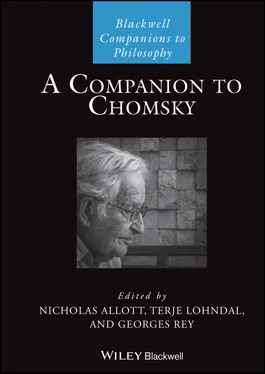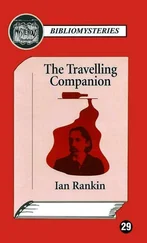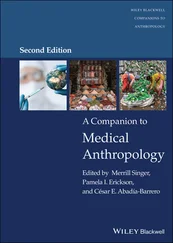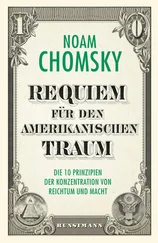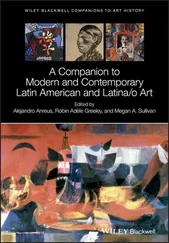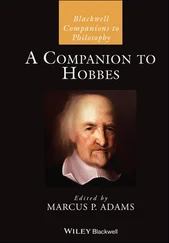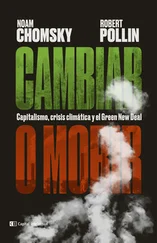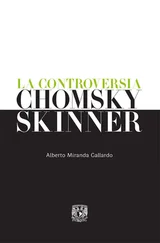A Companion to Chomsky
Здесь есть возможность читать онлайн «A Companion to Chomsky» — ознакомительный отрывок электронной книги совершенно бесплатно, а после прочтения отрывка купить полную версию. В некоторых случаях можно слушать аудио, скачать через торрент в формате fb2 и присутствует краткое содержание. Жанр: unrecognised, на английском языке. Описание произведения, (предисловие) а так же отзывы посетителей доступны на портале библиотеки ЛибКат.
- Название:A Companion to Chomsky
- Автор:
- Жанр:
- Год:неизвестен
- ISBN:нет данных
- Рейтинг книги:3 / 5. Голосов: 1
-
Избранное:Добавить в избранное
- Отзывы:
-
Ваша оценка:
- 60
- 1
- 2
- 3
- 4
- 5
A Companion to Chomsky: краткое содержание, описание и аннотация
Предлагаем к чтению аннотацию, описание, краткое содержание или предисловие (зависит от того, что написал сам автор книги «A Companion to Chomsky»). Если вы не нашли необходимую информацию о книге — напишите в комментариях, мы постараемся отыскать её.
Companion
Companion
A Companion to Chomsky
A Companion to Chomsky — читать онлайн ознакомительный отрывок
Ниже представлен текст книги, разбитый по страницам. Система сохранения места последней прочитанной страницы, позволяет с удобством читать онлайн бесплатно книгу «A Companion to Chomsky», без необходимости каждый раз заново искать на чём Вы остановились. Поставьте закладку, и сможете в любой момент перейти на страницу, на которой закончили чтение.
Интервал:
Закладка:
A related concern about Chomskyan linguistics has to do with its heavy reliance on speakers' “intuitions,” or verdicts about the acceptability and interpretation of sentences or phrases presented to them in books or lectures, as in queries about WhyNots. These don't seem like the experimentally controlled data with which serious science is normally concerned. Indeed, such intuitions can seem more like the armchair speculations of traditional philosophers that have been the object of much recent skepticism. In Chapter 35, Steven Gross reviews much of the recent discussion of this topic, discussing the similarities and differences between such linguistic judgments and the kinds of judgments about visual appearances on which vision theorists routinely rely.
Chomsky's interest in idealization leads him to be skeptical about theories of insufficiently idealized domains, not only of “E‐languages” and speech production, but of human behavior in general. To a first approximation, issues that might be amenable to an idealized explanation in terms of an underlying competence system he regards as problems while issues that involve massive interaction effects between systems such as the decision‐making of agents, he regards as “mysteries,” unamenable to scientific understanding. Collins calls attention in Chapter 36to problems with the distinction as Chomsky draws it.
Many have wondered how someone so concerned with abstract idealizations of the sort Chomsky seeks in linguistics could also be as deeply concerned with such concrete and enormously complex phenomena as the kind of human behavior involved in politics. Part of Chomsky's view here is that political research is precisely not particularly theoretical, but involves simply paying closer attention to the mass of information about actual events of states and individuals in the world that, he argues, standard discussions in the public media often systematically ignore (Chomsky refers to the failure of people to learn the facts about present political realities as “Orwell's Problem.” Whereas “Plato's Problem” is how people can learn so much given the exiguousness of experience, Orwell's is: how can people know so little, given the actual accessibility of political information). Joshua Cohen and Joel Rogers examined this issue at length in their (1991) article from which Chapter 37has been excerpted, and they bring to light some of the background assumptions of Rationalism and the Enlightenment generally that have informed both Chomsky's linguistics and his political discussions.
Endnotes
1 1See, for example, Cowie (1999), Pullum & Scholz (2002), Everett (2012), Evans and Levinson (2009), Tomasello (2003), Evans (2014), Chater, Clark, Goldsmith & Perfors (2015), and Christiansen & Chater (2017).
2 2The focus on hierarchical structure and the generative ability of the grammar was a radical break with the work of Chomsky's mentor, Zellig Harris (see the biographical sketch), and all the other linguists of the era. Harris's work in the 1950s also made use of transformations, but these were different formally and in the (descriptive, not explanatory) role that they were intended to play. (See Collins 2008, 66–67; Newmeyer 1986, 4–6).
3 3Declaratives are sentences of the type whose default use is making statements; interrogatives are of the type dedicated to asking questions. A polar (or yes/no) interrogative is one inviting a “yes/no” response (in contrast to wh‐interrogatives which are formed with wh‐words such as who, what, where, which – see below for examples of these).
4 4For expository purposes, we illustrate the point using somewhat different examples from Chomsky 1955 and 1957 (cf. Chomsky 2013b, 651–652), and the theory as we set it out here (very informally) is closer to work from the 1960s. For a more rigorous presentation of the analyses in Chomsky 1957, including evidence for structure dependence, see Lasnik et al. 2000, especially chapter 1.
5 5On this cognitive turn, see Collins (2008, ch. 4) and Chomsky (1975), where Chomsky says that questions of cognition were in the “immediate background” in his work in the 1950s, but he thought it “too audacious” to set them out. (See also below.) The locus classicus for the cognitive conception is Chomsky's influential Aspects of the Theory of Syntax (1965).
6 6It's important to see that the universals of UG need not be manifested in every language. UG apparently provides options and constraints. Not every language makes use of every option, and thus some of the constraints may not be visible in that language. For example, the constraint barring wh‐movement out of conjoined constituents (as in the example that follows) would not be visible in a language that lacks wh‐words or conjunction.
7 7Stars in front of a sentence indicate ungrammaticality. Some other WhyNots that point to other, more difficult‐to‐specify constraints:Who did stories of scare Mary?Who did Susan ask why Sam was waiting for __?(cf. Susan asked why Sam was waiting for Bill.)Who do you wanna laugh? (cf. I want Bill to laugh.)I want a book you've in the car (vs. you have).I know I should go home, but I don't want *(to) (i.e., one needs “to”).He hopes John will win (where he = John).
8 8Chomsky's master's thesis was an expanded version of his 1949 undergraduate honors essay, “Morphophonemics of modern Hebrew.” (On this early work, see Newmeyer 1996, ch. 2.)
9 9It is crucial to note that the issue here concerns the characterization of the grammar, with no commitment to whether or not “derivational steps” are realized in the brain in real time.
10 10On the complex history of lexical semantics, with brief commentary on Chomsky's influence, see Pustejovsky 2016.
11 11One mind/body problem that Chomsky does take seriously is the traditional problem of “free will,” which many have thought is incompatible with the kind of “deterministic” theories that the natural sciences pursue. However, he (2010) regards this issue as not really a “problem” that can be addressed scientifically, but a “mystery” that will likely remain beyond possible human understanding. This view is sometimes associated with his views about the impossibility of a theory of speech “performance,” but it is importantly independent of it: performance may simply be a massive interaction effect, unamenable to theory, involving no mysterious “free will” at all. Cf. below and Collins Chapter 36 of this volume.
References
1 Allott, N., and G. Rey. 2017. The many errors of Vyvyan Evans' The Language Myth. The Linguistic Review 34 (3): 1–20.
2 Apperly, I. 2010. Mindreaders: The Cognitive Basis of “Theory of Mind.” Hove, East Sussex: Psychology Press.
3 Boeckx, C. 2006. Linguistic Minimalism: Origins, Concepts, Methods, and Aims. Oxford: Oxford University Press.
4 Brentano, F. 1874/1995. Psychology from an Empirical Standpoint. 2nd ed. London: Routledge.
5 Carey, S. 2009. Origin of Concepts. Oxford: Oxford University Press.
6 Chater, N., A. Clark, J. A. Goldsmith, and A. Perfors. 2015. Empiricism and Language Learnability. Oxford: Oxford University Press.
7 Chomsky, N. 1951. The Morphophonemics of Modern Hebrew. Master's thesis, University of Pennsylvania. (Published by Garland, New York, 1979.)
8 Chomsky, N. 1955. The Logical Structure of Linguistic Theory. Ms. Harvard University and MIT. Revised version published in part by Plenum, New York, 1975.
9 Chomsky, N. 1957. Syntactic Structures. The Hague: Mouton.
10 Chomsky, N. 1959. “Review of B. F. Skinner, ‘Verbal behavior.’” Language 35: 26–58.
11 Chomsky, N. 1962. “Explanatory models in linguistics.” In Logic, Methodology, and the Philosophy of Science, edited by E. Nagel, P. Suppes, and A. Tarski, 528–50. Stanford: Stanford University Press.
Читать дальшеИнтервал:
Закладка:
Похожие книги на «A Companion to Chomsky»
Представляем Вашему вниманию похожие книги на «A Companion to Chomsky» списком для выбора. Мы отобрали схожую по названию и смыслу литературу в надежде предоставить читателям больше вариантов отыскать новые, интересные, ещё непрочитанные произведения.
Обсуждение, отзывы о книге «A Companion to Chomsky» и просто собственные мнения читателей. Оставьте ваши комментарии, напишите, что Вы думаете о произведении, его смысле или главных героях. Укажите что конкретно понравилось, а что нет, и почему Вы так считаете.
